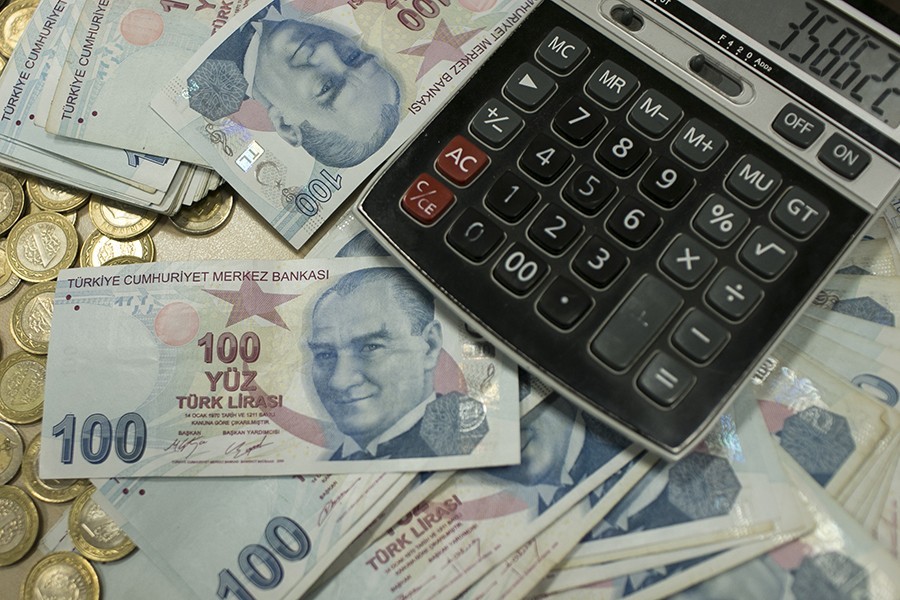What is the significance of the growth rate pointing to a sharp fall in the economy?
Turkey's economic growth fell sharply in the third quarter of the year to 1.6 per cent. Bülent Falakaoğlu summed up the significance of this data.
 Photograph: Murat Kula/AA
Photograph: Murat Kula/AA
The Turkish Statistical Institute (TurkStat) has announced the GDP data (growth rates) for the third quarter of 2018. Having grown at 7.3 per cent in the first quarter of the year and 5.2 per cent in the second, the Turkish economy grew at the sharply reduced rate of 1.6 per cent in the third quarter. The expectation was for growth to come in at the rate of two per cent.
The Turkish economy grew at 11.1 per cent in the same period of last year. Seasonally and calendar adjusted GDP fell by 1.1 per cent on a quarterly basis in the third quarter of 2018. The agricultural sector grew by one per cent in this period. With exports increasing by 13.6 per cent, imports shrank by 16.7 per cent on an annual basis.
FALAKAOĞLU: THE ECONOMY ACTUALLY DECLINED BY 1.1 PER CENT
Evrensel’s Economics Columnist Bülent Falakaoğlu summed up the significance of the announced figures:
“The announced figures herald the collapse of the government’s thesis that the ‘worst is over’ to which it resorted following on from ‘the crisis is psychological.’
The third quarter encompasses the months of July-August-September. In July, a Turkey that had left the election behind it and was increasing its investments achieved growth in the industry. The growth trend in the economy continued until the dollar exchange rate suddenly shot over six TL in August. Industrial growth came in at 1.7 per cent in August. The negative developments actually kicked in at the start of September. Industry shrank by 2.7 per cent in September and domestic demand embarked on a rapid decline. This signalled the taking of a turn for the worse by the economy.
As the contraction in the economy was restricted to the final month of the third quarter, i.e. September, an optimistic expectation held sway in the markets that economic growth would be in the region of two per cent. The announced figures showed the data falling short even of such meagre optimistic expectations.
However much a growth figure of 1.6 per cent was announced for the third quarter, on a seasonally and calendar adjusted basis, the appearance of growth of 1.6 per cent in the economy, in fact, gives way to a contraction of 1.1 per cent.
Moving on from these third-quarter figures to the fourth quarter, where we are now, we witness a continued deepening of the contraction of the economy, that is the crisis. With a shrinking of 5.3 per cent witnessed in the construction sector alone in the third quarter, a half point or single point increase is observed in the others (agriculture, industry). In the fourth quarter, there will be no further prospect of seeing even such small, modest increases, because a glance at the fourth-quarter figures reveals a rapid contraction in manufacturing, consumption and foreign trade. The incentives given to boost manufacturing from automotive to white goods have not succeeded in stemming the contraction and have simply achieved a modest slow-down in the speed of the contraction.
To give an example of this on the automotive side, it has only proved possible to reduce the rate of the contraction in the automotive sector, which was in the region of 72 per cent, to around 38 per cent, but not prevent the contraction in the sector.
As far as consumption goes, domestic demand is falling fast and the economy manages to keep breathing with some exports, that is with external demand.
Looking in turn at the foreign trade figures much vaunted by the government, the painful truth strikes us that the manufacturing sector is not importing and capital-related export is very low (such as machinery and equipment) and weak consumption is reducing imports. In an environment in which the economy has not been weaned away from import dependence, a contraction of import in the areas we have mentioned points to a rapid contraction of the economy in the country.
When we add to this the eleven per cent reduction in loan volumes in the past three months, it appears that additional fuel could not be supplied to the economy.
‘THE WORST IS NOT OVER, WE ARE EXPERIENCING THE WORST WITH GREAT HARSHNESS’
In short, the worst is not over, we are experiencing the worst with great harshness and it has already become apparent that this negative situation will continue in the first two quarters of 2019. It is clear that, up until the local elections, i.e. until March 2019, the government will, even if unable to eliminate the crisis itself, step up moves to hide and conceal its effects. Working people should not be taken in and should position themselves as the reality of the economic crisis dictates.” (EVRENSEL DAILY)
Translated by Tim Drayton.


Follow Evrensel